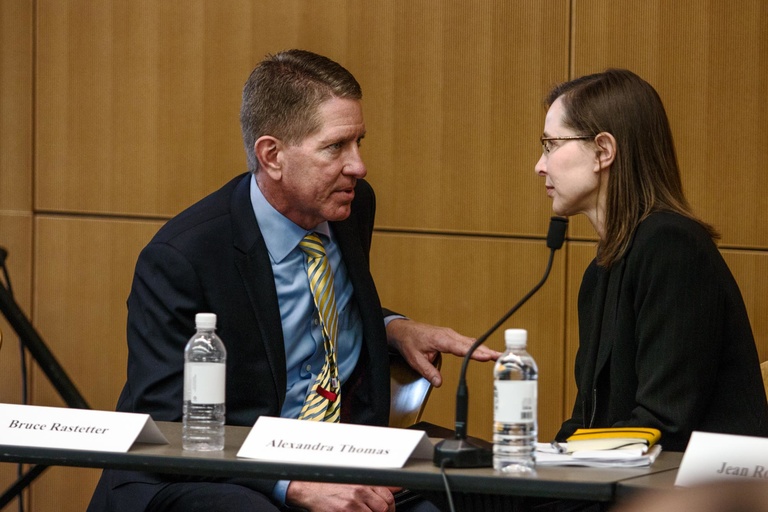
The 21-member committee charged with screening candidates to succeed Sally Mason as president of the University of Iowa held its first meeting today, Wednesday, March 25.
Jean Robillard, vice president for medical affairs and search committee chair, said, “The search is the responsibility of the Iowa Board of Regents. They are the ones who pick the committee, and they are the ones who will decide who is the next president.”
Board of Regents President Bruce Rastetter charged the committee with five duties: to assist and advise the board in the selection of the president; to work with the executive search firm in conducting the search and screening; to conduct a broad advertising campaign; to evaluate the nominations and applications; and to recommend, without ranking, three to four prospects for the board to consider.
“The most important job we have as regents is the selection of the president,” he said, urging the committee to cast a wide net. “Reach out nationally to the very best people and encourage them to be part of the process.”
Both Rastetter and Robillard said they believe that the university is well-positioned to attract top-caliber candidates.
Rastetter said he believes the committee should be able to bring finalists to campus for interviews in late August or early September. The names of finalists would be made public at that time.
Laurie Wilder, president of Parker Executive Search, an Atlanta-based firm that the board has engaged to support the search, told the committee she is “very comfortable” with that timetable and that she is confident about the quality of applicants.
“What you have at the University of Iowa will allow us to attract excellent people,” Wilder said.
The committee also received a briefing on open meetings and public records laws from Carroll Reasoner, the university’s general counsel. She reminded committee members that they are a government body that must give notice of its meetings, make decisions in open session, and maintain minutes. The law allows the committee to vote to go into closed session to discuss the qualifications of applicants, she said.
Reasoner also said Iowa law allows the committee to keep candidates’ identities confidential, if it determines that people would be “dissuaded from applying if their information will be made public.”
Wilder, the search consultant, said, “Confidentiality is vital for candidates, especially until you narrow it down to those who will come on campus. Candidates don’t want to publicly identified. They are in great positions, and they don’t want to jeopardize their careers.”
The next step in the process, Wilder said, is for Parker Executive Search to draft a detailed position description for the committee to consider. “I will tell you that position descriptions don’t really recruit candidates. They are for announcement purposes,” she said. “You want to cast a wide net, so don’t require so many things in the marketplace that you get too narrow of a pool.”
The next meeting of the committee has not yet been scheduled but is likely to take place in early May, officials said.